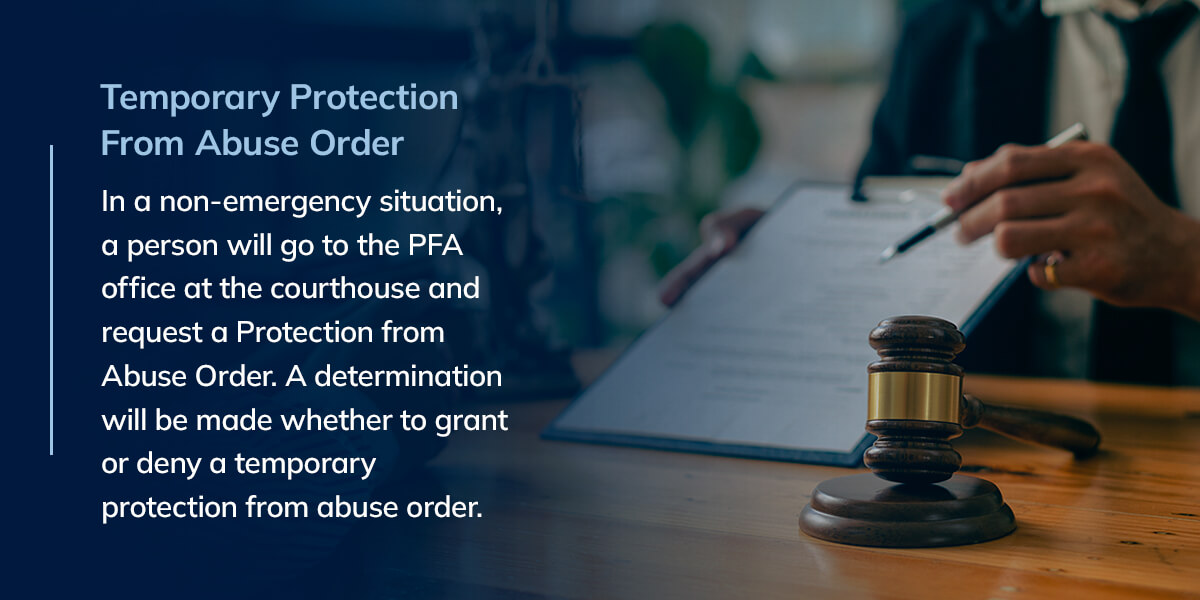
Table of Contents:
The physical and mental well-being of all persons must be efficiently safeguarded. According to the Pennsylvania Coalition Against Domestic Violence (PCADV), 112 Pennsylvanians lost their lives to domestic violence in 2021 alone. Among those were 70 females and 42 males. Pennsylvania has passed several laws to help protect its residents from violence, such as the Protection from Abuse (PFA) Act. But what is the PFA law all about?
The 1990 Protection from Abuse Act provides the procedure for obtaining a PFA order and the rules the victim, called the petitioner or plaintiff, and aggressor, called the respondent or defendant, must follow. It also provides the circumstances under which a person may commence an action and the duration of an order, among other things. Before diving deeper, let’s look at the meaning of PFA in Pennsylvania.
PFA is a civil law that seeks to protect persons who have encountered actual or threatened acts of physical and sexual violence. It allows individuals to seek protection from the court against abusers, even in the absence of a criminal charge. Many individuals relate PFA orders to restraining orders. The terms are often used synonymously, but a PFA is not a criminal action.
The PFA process is civil, although they can eventually end up in criminal actions, such as cases where the abuser violates a court order. The PFA process is intended to give relief to an individual against their abuser, which may include any of the following:
In certain instances, the court may order the alleged aggressor to vacate the shared residence or award temporary physical custody of the children to the victim, depending on the circumstances of each case.
There is the misconception that any individual can obtain a PFA against another individual who harasses or harms them. In reality, PFA’s are governed by two Pennsylvania statutory sections, which determine a PFA’s reach and limitations. The first section is in the “Domestic Relations” area of the law. The second section is found in the “Judicial Procedure” area of the law.
In the domestic relations area of law — 23 Pa.C.S. § 6102 — the statutory language defines “Abuse,” and in doing so, indicates those who can bring a PFA action and under what circumstances the action can be brought. According to the law, only acts between sexual or intimate partners, family or household members or persons who share biological parenthood can result in a PFA.
Thus, the Domestic Relations section does not permit a PFA to be brought against a co-worker, stranger or other persons outside the domestic setting.
Section 6102 also dictates the circumstances under which a PFA can be brought, including when the perpetrator:
The judicial procedure area of law relating to PFA has only been in effect since July 15, 2015. The PFA section under the judicial procedure area of law is found at 42 Pa.C.S. §62A01 and broadens the scope of who a PFA can be brought against. That section protects victims of “sexual violence” or “intimidation:”
In short, unlike the domestic relations area of law, the judicial procedure area of law protects non-family or household members.
The process for obtaining a PFA is pretty quick. However, each county follows a different process to get a PFA order. Here’s what the process typically looks like, using Lebanon County as an example:

In a non-emergency situation, a person will go to the PFA office at the courthouse and request a Protection from Abuse Order. A determination will be made whether to grant or deny a temporary protection from abuse order.
Whether denied or granted, the plaintiff and alleged perpetrator have a right to a hearing for a final determination to be made. However, the temporary protection from abuse order itself is by an ex parte hearing. This means the plaintiff typically makes their application in the absence of the alleged abuser. The order may contain restrictions preventing the alleged abuser from approaching or contacting the plaintiff.
Assuming a temporary order is issued, that order will usually last up to 10 days, within which time a Judge schedules a final hearing. A notice is given to the defendant, offering them the opportunity to appear and make their case.
It is possible for the temporary order’s protection to continue due to a party’s request to be represented by an attorney or due to a party being unavailable on the scheduled hearing date. In that case, the temporary order will remain until the final hearing can be held. When a final hearing is held, both sides will present their testimony and evidence. The parties may also cross-examine the other’s witnesses.
After hearing the parties and evaluating the evidence on record, the judge will make a determination whether to grant the PFA and make the temporary order final or deny the PFA. If the judge grants the PFA, they can set the PFA’s terms and the PFA’s length up to a maximum of three years. However, the judge may extend the duration where the need arises.
The judge may order the defendant to stay away from the plaintiff or child, as the case may be, for a specified duration or remove the defendant from the shared home. The court may also make orders relating to temporary child custody and support, order the payment of financial support, confiscate firearms within the defendant’s possession or direct the defendant to attend counseling. The terms of the final order depend on the facts of each case.
It is essential to note that the parties, usually through their attorneys, may avoid a PFA hearing and agree to the terms and length of the PFA, the maximum still being three years. Reaching an agreement outside a hearing can benefit the plaintiff and the perpetrator. The plaintiff does not risk the judge dismissing the PFA and obtains a court order, making the PFA final for their protection. The alleged abuser does not admit to any underlying PFA facts and agrees to have a PFA placed against them.
Yes, the court can dismiss a PFA action. Therefore, the plaintiff must make a compelling argument, especially when seeking a temporary PFA order considering that the application is made in the defendant’s absence. As the plaintiff, you must establish that the circumstances meet the requirements of the law and present sufficient evidence to prove the claim.
Your safety is paramount, so it’s best to contact the police immediately. Seek protection, especially when the abuser exhibits violent tendencies. Next, file an indirect criminal contempt complaint, which authorizes the court to issue a warrant of arrest. The court usually conducts a contempt hearing to decide the defendant’s fate. Disobeying the orders of the court gives the court the authority to impose a fine or sentence the defendant to a term of imprisonment.
Yes, a final PFA order may be canceled when the plaintiff makes a request. Typically, the court will conduct a hearing before making a determination, taking into account the plaintiff’s safety. In other words, if the court is satisfied that the plaintiff will be safe without the court-ordered protection and that the request was freely made, it made may cancel the order.
Protecting mental and physical well-being is crucial, so lawmakers have established mechanisms to help shield individuals against abuses. The PFA law is a classic example. Considering that PFA orders can have far-reaching effects on both parties, it’s best to make compelling arguments and support your claims with credible evidence. Thus, partnering with a lawyer is recommended.
The experienced PFA attorneys at Buzgon Davies Law Offices can help you file a PFA complaint or defend a claim made against you. Our team of supportive professionals is available to listen and guide you throughout the process. Contact us now for practical, confidential and individualized legal solutions!
The information in this blog is for informational purposes only and is not to be construed as legal advice and does not create an attorney/client relationship.